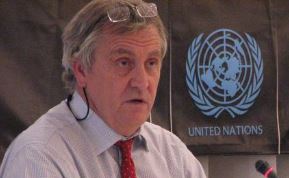The United Nations Mission in South Sudan (UNMISS) on Thursday warned that the implementation of the Revitalised Agreement and its Roadmaphave been relegated to the back burner following the extension of the tenure of the unity government.
The Special Representative of the Secretary-General and Head of UNMISS, Nicholas Haysom, warned in a press release that the political interests were once again playing out at the national level.
“UNMISS has been clear. The clock on South Sudan’s fourth extension has started ticking. It doesn’t reset in February next year when the extended transition begins,” he said.
“I have been holding intensive discussions with political leaders, civil society, faith-based representatives, youth leaders, women’s coalitions, and international partners. This has left me in no doubt that, as the Secretary-General has stated, the only way forward is for the South Sudanese leaders to urgently find the compromises, modes of implementation and take the decisive steps required to achieve a critical mass of key benchmarks set out in the Revitalised Peace Agreement,” Haysom explained.
He disclosed that he recently met with President Salva Kiir to discuss the urgent need for progress, informing him of the productive engagements with other national stakeholders and emphasizing the importance of his continued involvement in this regard.
“This has left me in no doubt that, as the Secretary-General has stated, the only way forward is for the South Sudanese leaders to urgently find the compromises, modes of implementation and take the decisive steps required to achieve a critical mass of key benchmarks set out in the Revitalised Peace Agreement,” he said.
UNMISS, Haysom explained, had identified six achievable benchmarks, which the parties can address immediately.
The six are deploying the Necessary Unified Forces (NUF), starting Phase II of their joint training, and agreeing the middle command structure; starting civic education; voter registration, amending the National Security Services Bill, so as to expand civic and political space; developing a code of conduct between political parties, civil society and the media, and clarifying responsibility-sharing for electoral security.
He, however, regretted that the Kenya-based Tumaini Initiative talks, aimed at bringing the holdout opposition groups into the peace agreement, had largely stalled although, upon the invitation of President Kiir, President William Ruto of Kenya visited Juba on Wednesday.
“The presidents apparently decided to reconvene this mediation, resolving outstanding issues within two weeks and to secure, thereafter, a regional endorsement,” he said.
On a more positive side, Haysom noted that UNMISS and the humanitarian partners supported the government and had successfully led the development of a joint plan to prepare and respond to the needs of up to 1.5 million flood-affected people.
“These efforts included the implementation of flood mitigation projects such as dyke construction and early warning systems. But many communities remain vulnerable due to inadequate infrastructure and resources – so we are certainly not out of the woods, particularly as floodwaters stubbornly persist in many areas even when rains subside and river levels drop,” he said.
Haysom urged the international community to rally around the immediate tasks to support a peaceful conclusion to the transitional period.
“We acknowledge that it is difficult to keep the focus on South Sudan at a time of competing global crises but remain convinced that, neither the country nor the region, is capable of withstanding another relapse into conflict,” he said.




